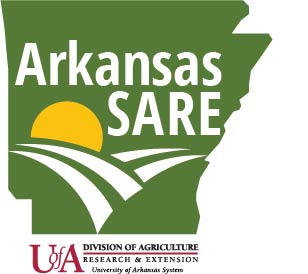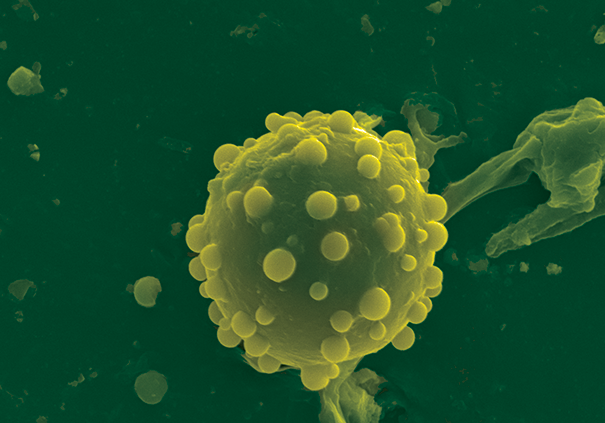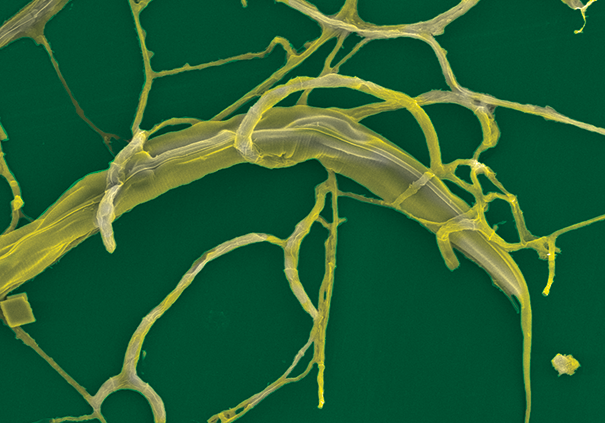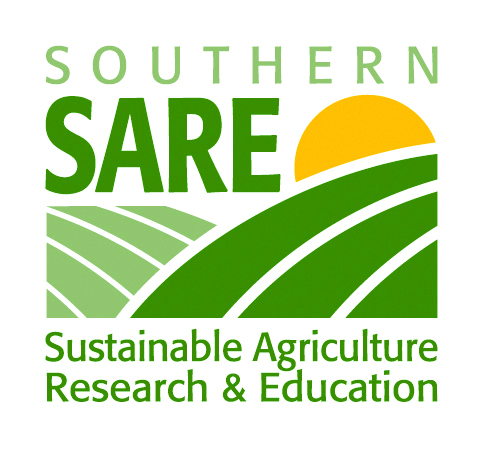Commercial Horticulture

Grazing with the Fun Guy (Fungi), a New SSARE Funded Research Grant in Arkansas

Chlamydospore of the fungus Duddingtonia flagrans (Df). Photo courtesy of the International Animal Health of Australia.
This new research grant project uses a systems research approach to examine strategies to include Duddingtonia flagrans (Df), a nematode-trapping fungus, to minimize the need for dewormer in sheep and goats in research and farmer's flocks/herds. Other worm control tools including genetics will be included. We aim to show it is possible to provide a strategy to offer the fungus, which controls gastrointestinal worms on pasture leading to improved animal health and productivity and enhancing the sustainability of livestock farms.
Summary of the Research Grant Project
Since our first SARE R&E grant in 2002 (Novel approaches for sustainable control of gastrointestinal nematodes in small ruminants in the southeastern US; LS02-143), we have strived to include nematode-trapping fungus in the toolbox for livestock producers to control gastrointestinal nematode (GIN) parasites. However, the commercialization of the fungus (BioWorma®) took 17 years! GIN are the major health threat for ruminant livestock confounded by dewormer resistance. GIN infections can lead to anemia, poor weight gains and death. The goal of most sustainable farms is to eliminate chemical inputs and control GIN. The “Fun Guy” (Fungi) brings this closer to reality. The fungus can remove much of the GIN on farm. Approximately 90% of GIN are found on the pasture and 10% in the animal; Df can reduce up to 90% of larvae on pasture. A drawback is that the product is considered costly by most farmers (between $0.20 to 0.60 per 100-pound animal per day). Thus, it is imperative to build a strategic program for farmers that considers effectiveness and economics. For example, can Df be fed every other day, or every other week or only in loose mineral supplements? These questions will be answered in research flocks/herds and on farm by examining changes in fecal egg counts, pasture larval counts and/or animal worm counts.

Gastrointestinal nematode being captured by the fungus Duddingtonia flagrans (Df). Photo courtesy of the International Animal Health of Australia.
Genetic selection for resistance and/or resilience to GIN represents the most promising means to minimize GIN infection, and with good pasture management and nutrition, can nearly eliminate the need for deworming. Parasite resistance is the ability of the animal to initiate and maintain an immune response to suppress establishment or eliminate GIN. Resilience is the ability to maintain production even when parasitized. The ARS flock and one of the farm flocks are enrolled in the National Sheep Improvement Program which upon receiving data on flock animals returns breeding values including for parasite resistance. Rams with exceptional parasite resistance will be compared with susceptible or unknown resistance on at least three of the cooperating farm flocks with similar breed type to evaluate FEC/resistance in offspring.
Another alternative that will be used for control of GIN with the fungus is copper oxide wire particles (COWP). COWP is administered as a bolus to sheep or goats in need, typically based on FAMACHA (scores of 1 or 2 do not need deworming, scores of 3 may, and scores of 4 and 5 indicate dire need for deworming). COWP targets barber pole worm, but not other GIN that could cause weight loss and diarrhea. COWP is commercially available and cost as little as 7¢/treatment for low doses (0.5 g) which minimize risk of copper toxicity. COWP is accepted by some organic certifiers as a dewormer, thus organic status can be maintained. Several cooperating farmers in this research project use COWP for worm control.
Relevance to Sustainable Agriculture
This project focuses on environmentally friendly tools that with proper management have the potential to essentially remove worm parasites and chemical inputs from the farming system leading to greater resilience. Farmers currently manage their small ruminants by moving to new pastures, making sure that water and mineral sources are not overly contaminated with parasite-laden manure, and adding chemicals through deworming. If the internal parasite larvae numbers are greatly reduced on pasture due to the genetics of resistance within the animal and the nematode-trapping fungus in the manure, small ruminants and their chemically clean manure can be used to benefit the soil, especially the soil microbiology increasing microbial diversity. This will improve soil health, increase organic matter, and help to regenerate a farm’s soil and forage resources, some of the core principles of regenerative agriculture. An added payout is improved livestock production. Consumers are increasingly interested in sourcing products from farms that use regenerative practices including minimal use of pharmaceutical interventions. This includes forgoing the use of chemical inputs while continually improving soil health. Small ruminant producers’ reliance on dewormers has not only created increased input costs but has negatively affected biodiversity in gut of animal and soils. Also, wormy animals make it more challenging for producers to maintain a rotational grazing system if affected animals must be continually treated or removed to a dry lot until health is restored. Enabling producers to raise small ruminants with fewer parasites will allow producers to better satisfy the changing consumer market while simultaneously bettering soil health and the overall holistic wellness of their farms.
The Team
The team of researchers includes Joan Burke (USDA, ARS, Dale Bumpers Small Farms Research Center, Booneville, AR), Tom Terrill and Niki Whitley (Fort Valley State University, GA), and Adriano Vatta (Louisiana State University). Outputs and farmer friendly publications will be found on the website of the American Consortium for Small Ruminant Parasite Control (www.wormx.info). You can also learn more about the researchers on the website. The on-farm research will include farmers from Arkansas, Georgia and Louisiana.

Dr. Joan Burke
Research Animal Scientist
USDA-ARS
Booneville, AR

Dr. Tom Terrill
Professor of Animal Science
Fort Valley State University
Fort Valley, Georgia

Dr. Niki Whitley
Animal Science Extension Specialist
Fort Valley State University
Fort Valley, Georgia

Dr. Adriano Vatta
Associate Professor of Pathobiological Sciences
Louisiana State University
Baton Rouge, Louisiana
